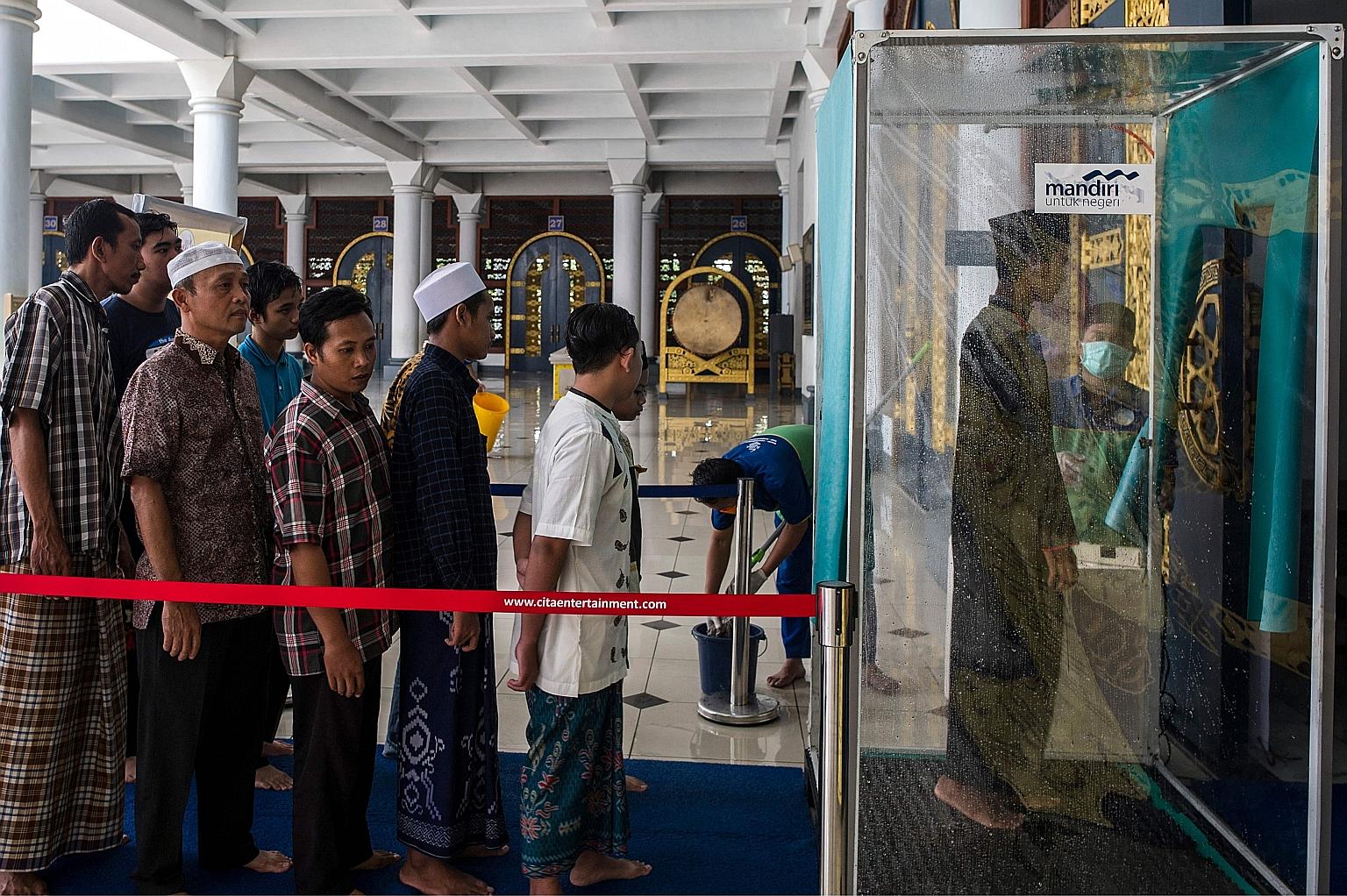Coronavirus pandemic
Indonesia may ban Hari Raya exodus to stop spread of virus
Move being considered to block city dwellers from infecting people in their hometowns
Sign up now: Get insights on Asia's fast-moving developments

Indonesians have to walk through a disinfectant chamber before entering a mosque during Friday prayers yesterday in Surabaya, East Java, as a measure to stop the spread of the coronavirus.
PHOTO: AGENCE FRANCE-PRESSE
JAKARTA • The Indonesian government is mulling over a plan to ban this year's "mudik", the annual hometown exodus for the Muslim Lebaran - or Hari Raya - holidays.
The move is being considered in order to prevent city dwellers from potentially spreading the coronavirus to towns and villages across the archipelago, but questions remain as to how such a ban would be implemented.
Ramadan is expected to take place from April 23 to May 23 this year, followed by the Lebaran holiday on May 24 and 25.
This Lebaran season was expected to see some 20 million people travel to their hometowns, resulting in a massive stream of urbanites to rural areas.
But the coronavirus crisis that has infected at least 1,046 people and killed 87 nationwide as of yesterday has led government officials and experts to express fears that the exodus might trigger an explosion of cases and deaths.
The Office of the Coordinating Maritime Affairs and Investment Minister held a meeting with other institutions on Monday to discuss the matter.
The office's spokesman, Mr Jodi Mahardi, said a mudik ban was an option "seriously considered" by the government. "The safety of the people is our priority," he told The Jakarta Post on Thursday.
A limited Cabinet meeting was also due yesterday to discuss the government's final decision on the issue.
In a press statement issued by the office on Tuesday, Mr Jodi explained that three scenarios had been presented to President Joko Widodo.
The first was the business-as-usual scenario - meaning the mudik would proceed just like in the past; the second was to allow people to proceed with the mudik but not actively support it, such as through companies offering free transportation as they typically do; and the last was to ban the mudik.
The statement also said the Transportation Ministry's air transportation directorate-general would reduce the passenger quota of flights by up to 50 per cent and would restrict vehicles from Greater Jakarta, deemed to be the epicentre of the virus within the country, from travelling to Central Java and East Java.
As several cities including Jakarta have ordered offices, schools and public centres to temporarily close to support the social distancing policy, several areas in Central Java have seen a surge in incoming traffic, which some have called an early mudik.
Transportation experts have also warned that the social distancing measures have left informal sector workers on low incomes with no option but to return to their hometowns to make a living.
Central Java governor Ganjar Pranowo said he had obtained reports from regents and mayors that the inflow of people from Jakarta to the province had already begun.
He said that in the town of Jepara, 44 buses had already arrived, carrying homecomers from Jakarta.
"It is indeed happening early, maybe because the offices and companies where they work had reduced their working hours or even stopped operating," he said.
In the province's Wonogiri regency, the local administration recorded 14,000 people coming into the regency last week, with the daily arrival of bus passengers twice the normal number at 2,000 people.
The Transportation Ministry has predicted that, without the restrictions, millions of Indonesians will hit the road using private vehicles in the next few weeks to avoid contracting the virus in public transportation.
The ministry has already abolished all free mudik travel programmes for this year given the country's state of emergency imposed until May 29 as a result of the coronavirus.
THE JAKARTA POST/ASIA NEWS NETWORK


